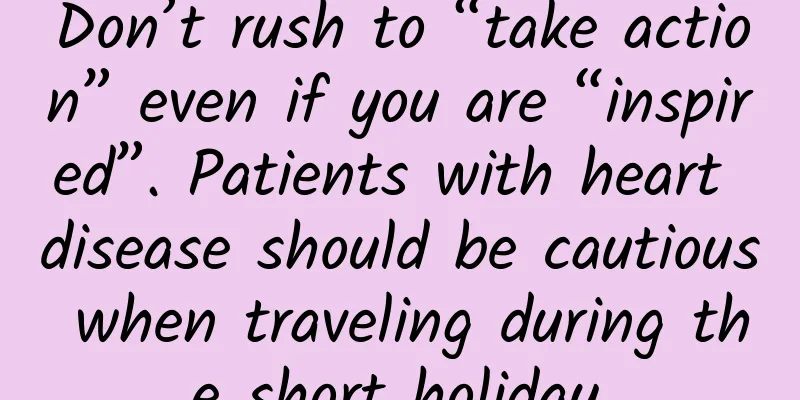Don’t rush to “take action” even if you are “inspired”. Patients with heart disease should be cautious when traveling during the short holiday.

|
Written by Shi Shutian (Deputy Chief Physician, Department of Cardiology, Beijing Anzhen Hospital, Capital Medical University) For most people, vacation time is a way to get away from the busy work and life and enjoy the fun of traveling. However, for people with heart disease, traveling may also bring certain risks. Therefore, people with heart disease need to prepare and plan to ensure their health and safety during the holiday travel. Before you travel 1. Seek medical advice. Traveling is a good way to maintain physical and mental health. No matter what your physical condition is, traveling is a good experience to relax and enjoy life. However, before traveling, heart patients need to undergo a comprehensive physical examination and assessment under the guidance of a doctor to determine their physical condition and health. For patients with poor heart function, they need to adjust travel plans appropriately, avoid excessive fatigue, choose relatively comfortable and safe travel destinations and ways of playing, and adjust diet, exercise and drug management in a targeted manner to ensure safety. Different types of heart disease patients need to develop reasonable travel plans and management measures based on their physical conditions and rehabilitation needs, striving to achieve the trinity of travel, rehabilitation and relaxation. 2. Prepare common medicines. Heart disease patients usually take medication regularly, but these drugs may not be easily available at their travel destinations. Therefore, after confirming the travel plan, you should prepare your usual medications and related emergency medications in advance, and ensure that the medication reserves are sufficient and the drug labels are clear, so that you can ensure that you have medication to take after you go out. 3. Bring necessary supporting documents. If you need to travel long distances, especially traveling abroad, you should make sure to carry the necessary health materials, such as past medical records, diagnosis certificates, medication lists, etc. If you need to take a plane, you also need to explain your physical condition to the security personnel before the airport security check, especially patients with pacemakers need to carry an installation certificate card. 4. Avoid excessive exercise. Proper exercise can enhance the body's cardiopulmonary function and improve the body's resistance. If heart patients do not exercise for a long time, the heart function will further decline, which is not conducive to the recovery of the disease. However, incorrect exercise can also induce the onset of coronary heart disease symptoms, arrhythmia and even heart failure. For example, due to excessive exercise or long-term inactivity, sudden high-intensity exercise such as mountain climbing and long-distance running will cause excessive fatigue of the body, increase the burden on the heart, cause myocardial ischemia and hypoxia, and then induce myocardial infarction. Therefore, heart patients need to consider their physical condition when making travel plans and avoid excessive exercise. Things to note when traveling 1. Avoid emergencies. Heart disease patients should always pay attention to their physical condition during travel. If any abnormality occurs, they should stop and rest in time and tell their travel companions or relevant personnel so that they can get help. If symptoms such as palpitations, chest pain, and severe breathing difficulties occur, they should end the current activity and stop to rest immediately. If the symptoms cannot be relieved after rest, it is recommended to go to the hospital immediately to avoid delaying treatment. 2. Pay attention to altitude sickness. If the tourist area is located at a high altitude, such as above 3,000 meters, heart patients may experience symptoms such as palpitations and dyspnea due to altitude sickness. In this case, patients should reduce their exercise and rest more to help their bodies adapt to the plateau climate. At the same time, they must ensure adequate sleep and drinking water to prevent dehydration. 3. Stay away from high temperature or cold areas. For heart patients, temperature changes may have adverse effects on the body. During the May Day holiday, the temperature varies greatly from place to place. Heart patients need to understand the local climate conditions in advance before traveling and try to avoid traveling to hot or cold areas. You need to pay attention to weather changes at any time, choose appropriate clothing and activities according to local climate conditions and your own situation, and avoid staying in hot or cold environments for a long time. In addition, heart patients must pay attention to keeping warm and hydrated when the temperature changes greatly, maintain the body's fluid balance, and pay attention to their physical condition at all times so that they can take timely measures to respond. 4. Avoid smoking and drinking. For heart patients, even in relaxing occasions such as travel or gatherings, they should avoid smoking and drinking, because these behaviors will have a negative impact on heart health. In particular, the harmful substances contained in tobacco, such as nicotine, tar, carbon monoxide, etc., have a very serious harm to heart health and can cause various cardiovascular diseases, such as myocardial infarction, coronary heart disease, arrhythmia, etc. Therefore, heart patients need to avoid smoking and drinking as much as possible. At the same time, they should communicate with their relatives and friends to let them understand their physical condition, try not to smoke when they are around, avoid exposure to secondhand smoke, and help themselves develop a healthy lifestyle, so as to better protect their heart health. 5. Measure blood pressure and heart rate regularly. Heart disease patients need to check their physical condition regularly during travel, especially blood pressure, heart rate and other physical indicators. They need to follow the above-mentioned suggestions, maintain good eating habits, get enough rest and exercise properly, and consult a doctor if necessary. This can help control the symptoms of heart disease and reduce unnecessary health risks. 6. Ensure adequate sleep. For heart patients, getting enough sleep is very important for health. During travel, heart patients need to avoid excessive fatigue and lack of sleep. Generally speaking, adults need to ensure 7-8 hours of sleep every day. During travel, heart patients should try to follow their personal habits and go to bed and get up at the same time every day to maintain the stability of their biological clock. Avoid taking long naps and staying up late, especially overwork and playing can easily lead to lack of sleep. Avoid having dinner too late and eating too much, especially eating too much at dinner can easily affect sleep quality. Keep the sleeping environment quiet and comfortable, and try to avoid noisy and uncomfortable environmental interference. The mattress and pillow should be relatively soft to reduce neck pressure and pain, while maintaining a correct sleeping posture. Notes at the end of the tour After returning home from your trip, you should adjust to your daily life as soon as possible, continue to monitor your health, maintain a good diet and exercise habits, and try to avoid excessive physical labor. If you have any doubts or concerns, you should consult a doctor immediately and undergo appropriate examinations. 1. Continue to monitor your physical condition. After the trip, you need to continue to check your physical indicators, such as blood pressure, heart rate and other physical indicators to ensure that your physical condition is stable. 2. Avoid overwork. After traveling, you need to gradually resume your daily life and avoid excessive fatigue and strenuous exercise to protect your heart health. 3. Maintain good eating and exercise habits. After traveling, you need to continue to maintain good eating habits and moderate physical exercise to maintain your health. 4. Continue to follow your doctor's advice. After your trip, you need to continue to follow your doctor's advice, take medication on time, control your diet, and exercise moderately to control your condition and prevent heart attacks. In short, as a heart patient, you need to seek medical advice before traveling, plan a reasonable travel plan, prepare necessary medicines and medical information to carry with you, and be prepared to deal with emergencies; during the trip, you need to try to stay mentally relaxed and physically comfortable, avoid excessive fatigue and excitement, and if you feel unwell or your condition changes, you should immediately seek help from a doctor and seek timely treatment to avoid worsening of the condition; after the trip, you should continue to monitor physical changes, maintain good eating and exercise habits, and seek medical attention in time if necessary. |
>>: Eating more tomatoes can whiten your skin? The April rumor list is freshly released
Recommend
Flower Pig’s fission activity method!
In the first half of the year, Hua Xiaozhu came o...
The Mid-Autumn Festival and National Day are approaching. How do major brands do marketing?
It is said that there are less than 100 days left...
WeChat's new version has huge changes! Is it going to become a live broadcast software?
WeChat has been updated again. Although this vers...
How much is the investment price of Hami Mechanical Equipment Mini Program?
Starting a business requires costs, and mini prog...
Methods of APP promotion and drainage
When operating an APP, one will inevitably have t...
Beats Solo3 vs. Sony h.ear mini WH-H800: Apple headphones are completely defeated?
For the headphones currently on the market priced...
6 Software Development Trends That Will Emerge in 2016
[[153073]] It may be a little early to predict th...
How precious are asteroid samples? Scientists are anxious because they can't retrieve them after collecting them
Collecting samples from distant asteroids is an e...
Why do you feel cold no matter what you wear in winter? Maybe you are wearing clothes in the wrong order
Audit expert: Zhang Tianjiao, professor at Beijin...
11 characteristics reveal which products can be sold without advertising
Why is it that even though some products are rare...
Should home appliance companies have multiple brands or a single brand? There is no right or wrong, only what is appropriate
As the Chinese home appliance industry collective...
Is Meizu mobile phone still alive? Does it have a chance to rise again?
On Weibo, there is a classic question with a play...
The launch of Shenzhou 18 was a complete success! One picture will help you understand the Shenzhou series of flight missions
At 20:59 on April 25, the Shenzhou 18 spacecraft ...
New energy vehicles have seen both glory and scandal this year
Before the arrival of 2017, the "shoe" ...
The "Roof of the World" was originally a "Valley"! What happened to the Qinghai-Tibet Plateau?
Author: Han Yangmei The Qinghai-Tibet Plateau, th...









